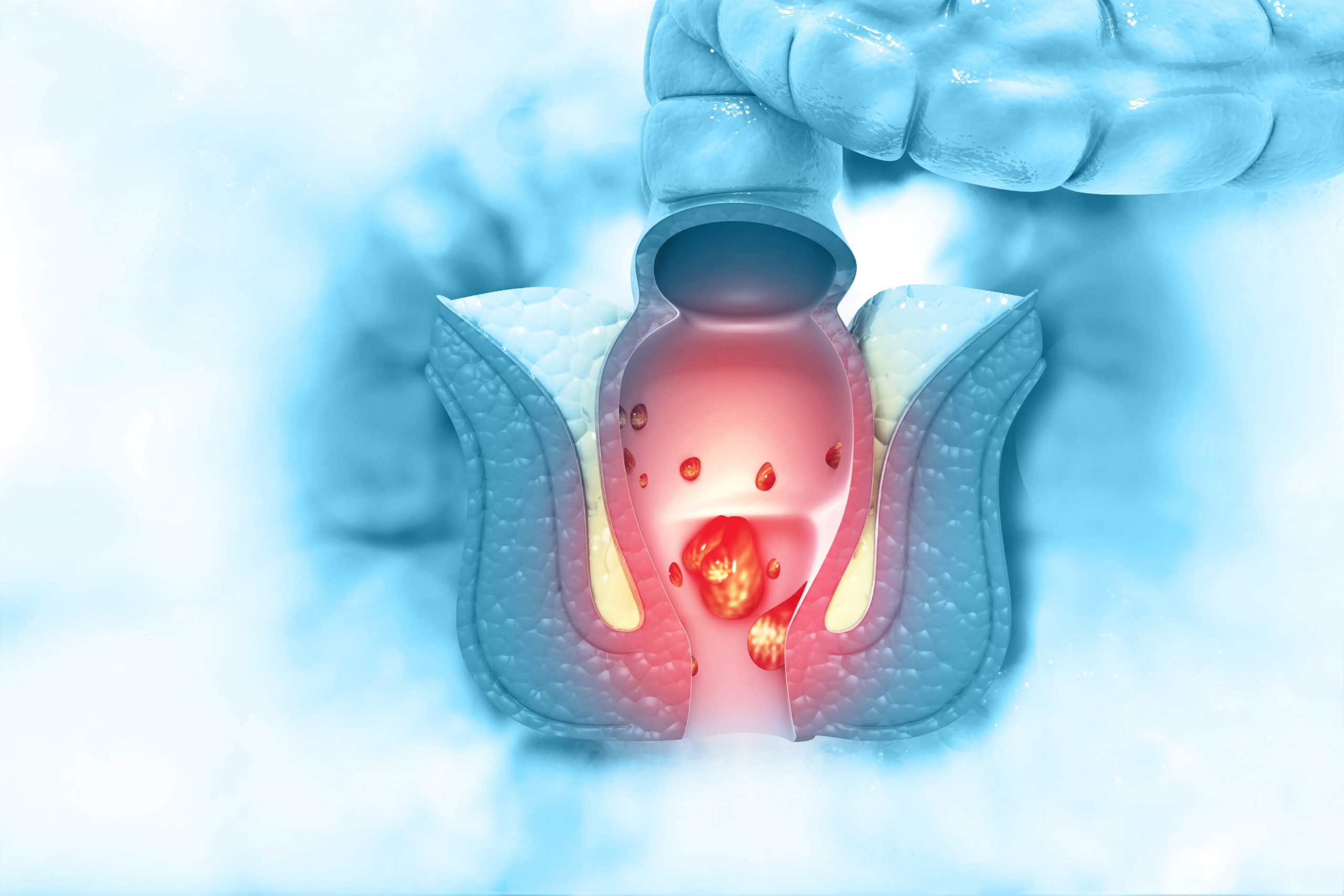


Medically reviewed by Dr. Sim Hsien Lin, Consultant General Surgeon (Colorectal Surgery)

Haemorrhoids, also known as piles, are swollen veins that develop around the anus and lower rectum. Nearly 75% of adults will experience haemorrhoids multiple times in their life. However, there are many treatments available, which include lifestyle modifications and surgical methods.
Piles (Haemorrhoids) are caused by the stretch of blood vessels that occurs around the anus, resulting in inflammation and swelling. Piles are usually triggered by excess pressure on the lower region of the rectum due to:
Piles (Haemorrhoids) are classified into external and internal haemorrhoids. The symptoms for both types vary and may sometimes remain dormant, which can make it hard to identify.
External haemorrhoids typically develop near the anus and can cause significant discomfort. Common symptoms might include anal pain, irritation, itching, swelling, and even bleeding. External haemorrhoids can swell up into hard lumps, which may bleed if ruptured.
>Internal Haemorrhoids develop inside the rectum and can rarely be felt or seen. They usually do not cause much discomfort and symptoms include bleeding when releasing stool. However, a prolapsed or protruding internal haemorrhoid, which cannot be pushed back in, can cause severe pain.
The most effective ways of preventing piles are to refrain from straining your anal muscles and to maintain healthy bowel movements. These are some ways to encourage soft stool and relaxed muscles.
High fibre foods like vegetables, fruits, and whole grains help soften your stool to prevent the strain that causes the formation of haemorrhoids.
If you find it challenging to achieve the daily recommended fibre level of 20 to 30 grams, fibre supplements can be a good substitute for the nutrients you need. Studies recommend supplements like psyllium husks as a great alternative to improving symptoms and reducing bleeding from haemorrhoids.
Hydrating yourself with fluids can keep your stool soft and healthy, reducing the risk of constipation and excess pressure on your anal region. It is recommended to drink 6-8 glasses of water per day.
As obesity is another cause of haemorrhoids, working out can help lose weight and avoid the condition. Doctors recommend 20 to 30 minutes of daily low impact exercise such as brisk walking to maintain healthy bowel movements.
Sitting for long periods on the toilet seat can exert too much pressure on the veins around your anus, causing them to swell. Instead, you should go to the bathroom as soon as you need to as waiting too long can dry out your stool, which results in constipation and added pressure on your bottom.
In most cases, haemorrhoids usually resolve without any treatments. However, if you are experiencing discomfort, altering certain lifestyle choices can help reduce the symptoms and manage the condition. They include:
As mentioned, fibre-rich diets and adequate water intake are the key to healthy bowel movements and reducing the risk of constipation. Keeping up with these habits can help to subside your symptoms and discomfort.
Breathable fabrics such as cotton can help with reducing irritation caused by prolapsed haemorrhoids. Keeping yourself cool and avoiding perspiration around your anus can help avoid further irritation of the haemorrhoid. Stay away from any tight-fitting undergarments or pants that can cause friction and excess perspiration.
Forcing bowel movements is a huge cause of haemorrhoids and can also further worsen the condition. If you are struggling to push when you are on the toilet, it is recommended to stop and try again later. Secondly, visit the toilet immediately once you feel the need to go as controlling the urge can cause more stress on your anal muscles, which can aggravate the haemorrhoid.
Keeping the anal area clean is vital to the healing process. However, scented products such as perfumed toilet paper and wet wipes can irritate the region even more with their added chemicals. Instead, opt for chemical and fragrance-free wipes. When washing the anus, do not use soap as it can dry out and cause further inflammation of the haemorrhoid.
The medical treatment options for piles vary according to the grade of the haemorrhoid.
Grade 1 piles are small swellings on the inside lining of the anal canal that cannot be seen or felt from the outside. They do not prolapse or protrude out of the anus. These are common and can be diagnosed using a proctoscope during a proctoscopy.
Grade 1 piles are usually treated with medications or topical suppositories. Suppositories are a type of topical medicine meant to be inserted into the rectum, where they dissolve and are absorbed through the lining of the rectum. Your doctor may prescribe constipation medications to prevent your piles from recurring.
Due to the small size of Grade 1 piles, no surgical intervention is necessary.
Grade 2 haemorrhoids are internal haemorrhoids that prolapse but then go back inside the anal canal spontaneously without interference.
For Grade 2 haemorrhoids, doctors will often try conservative treatment therapies, such as painless in-office treatment procedures like rubber band ligation, injection sclerotherapy, or infrared coagulation. These treatments are performed on internal prolapsed haemorrhoids only, not external haemorrhoids. While these treatments for Grade 2 haemorrhoids usually last from six months to a year before they need to be repeated, results have shown that they can be effective on many patients and are done without anaesthesia and cause minimal discomfort.
Grade 3 haemorrhoids protrude through the anus during straining or evacuation but need to be manually returned to position.
Grade 4 haemorrhoids remain prolapsed outside of the anus and cannot be manually returned to position.
For treatment of Grade 3 and Grade 4 haemorrhoids, doctors will recommend surgical treatments. The most common surgical treatments are surgical haemorrhoid excision and surgical haemorrhoid stapling procedure.
While haemorrhoids can be self-medicated, you should see a doctor if you notice any of the following signs:
Seek immediate medical help if there is excess bleeding and you feel faint.
While haemorrhoids are a common condition among many adults, they can also be easily managed with proper lifestyle habits. However, if your condition worsens, speak to your doctor at the earliest stage and they will be able to recommend to you the available medical and surgical treatments if needed.




Dr. Sim Hsien Lin is a specialist colorectal surgeon in Singapore with over 10 years of experience in colorectal surgery. Her sub interests include laparoscopic colorectal surgery, transanal endoscopic microsurgery (TEMS), surgical management of piles, inflammatory bowel diseases and complex anal fistulas.
Read Full BioCome visit our clinic, which are equipped with modern and updated equipment, and a team that will take care of all your needs.
Dr. Sim became a Fellow of the Royal College of Surgeons (Edinburgh) in 2011, winning the Gold Medal award at the FRCS Exit Examination that year.
Dr. Sim firmly believes that transdisciplinary care is the key to supporting both the elderly and complex patients through their perioperative and recovery journey.
Dr. Sim firmly believes that transdisciplinary care is the key to supporting both the elderly and complex patients through their perioperative and recovery journey.
Book An AppointmentPlease fill up this form and we’ll get back to you shortly!

For quicker response, call us at+65 6261 9227

Chat with our friendly clinic staff through WhatsApp!